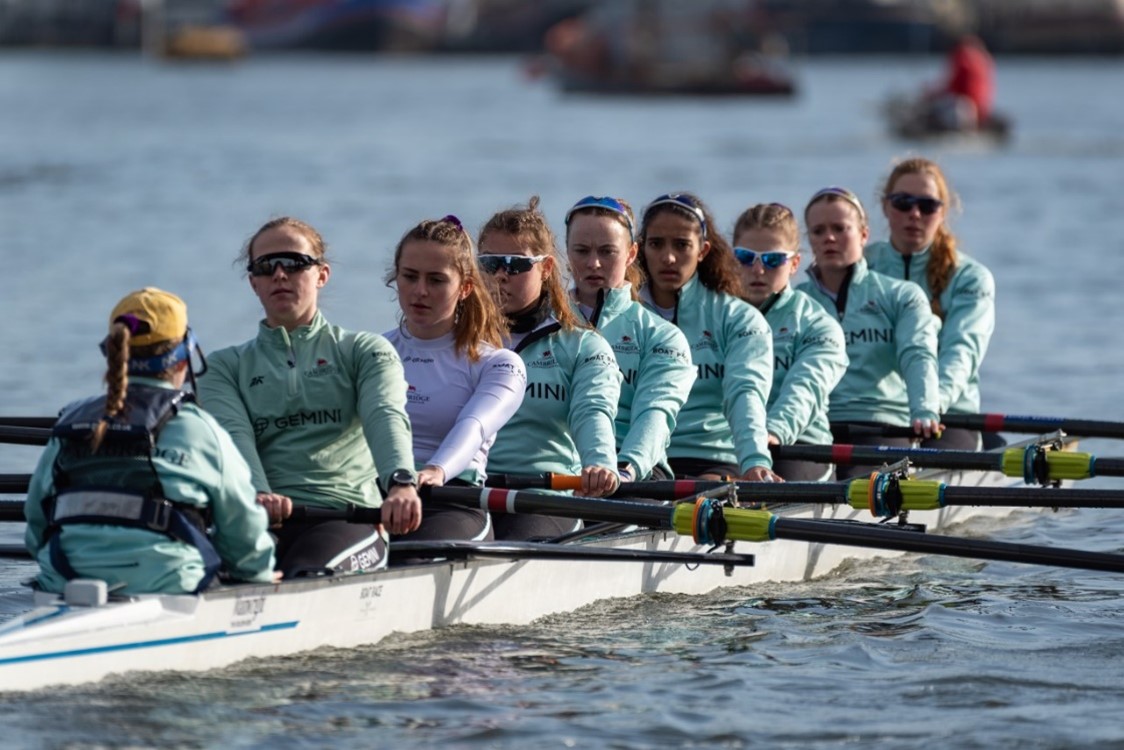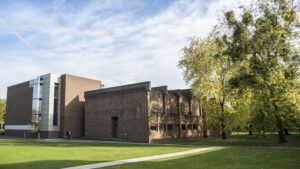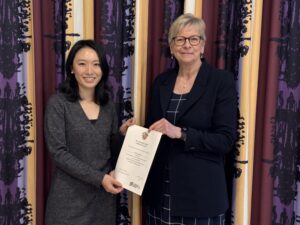The College is extremely proud to have two students involved in the university’s prestigious rowing programme as part of the aspiring Boat Race squad. They are third year NatSci student Iris Powell (U20), and MPhil Biotechnology student Nicky Wojtania (G22).
Rowing for Cambridge University (CUBC) requires a unique combination of academic and sporting excellence and the intense trialling process starts each season in September. We caught up with Iris and Nicky to celebrate their achievements and hear more about the commitment involved as well as their own personal motivations and challenges.
Iris’ Story
I grew up near Cambridge, in and around Peterborough, attending Stamford High School and The King’s School Peterborough before coming to Churchill in 2020.
Before I came to Churchill, I participated in a lot of club hockey, and before COVID-19 hit I was fairly certain that I wanted to continue playing hockey at Cambridge
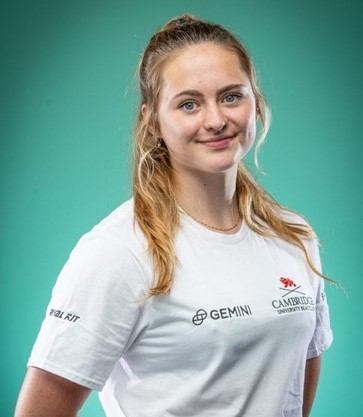
However, the lockdown provided an opportunity for self-reflection, and having done some research I took the decision to cease all exercise for an extended period to try and combat the RED-S (Relative Energy Deficiency in Sport) I had been dealing with for most of my teenage years. I was still on my self-enforced exercise ban when hockey pre-season rolled around,
so once term began in October I made the decision to play some different college sports, including Churchill ladies’ netball team (which I went on to captain in my second year), and something new in the form of rowing.
I had never considered rowing before coming to Cambridge, but the rowing community at Churchill is so strong, and even at college level you really do feel a part of something special. It was somewhat of an “if not now, when?” moment and I decided to give it a go!
The intensity of the training schedule rowing for CUBC is unlike anything I have done before. We train around 12 times a week, often 7 days a week, which is undoubtedly very time-consuming. Thankfully we normally return to Cambridge from morning training in Ely in good time, and the evening sessions can also be arranged so that on weekdays a 9-5 workday can be accommodated, but as we have very little time outside of this most of my working hours have to be productive! The squad is incredibly tight-knit and supportive, and I have made friends for life with my teammates, but probably the biggest challenge arising from the level of commitment required to row at this level is maintaining relationships outside of the club. When waking up at 5am most mornings to train, I am often in bed by 9pm, so socialising in the evenings with friends can be difficult; I have found it necessary to make a concerted effort to catch up with friends during the day over a coffee or a walk instead, but it is possible with a little forethought.
Although in a way it led me to rowing, the most obvious challenge that stands out to me is my battle with RED-S and hypothalamic amenorrhea. Women’s health, particularly in sport, is something that I am incredibly passionate about, and having experienced some particularly unfortunate advice from medical professionals myself, and having heard many others with similar experiences, I think it is absolutely something that needs more awareness drawn to it. Researching, and dealing with this issue entirely by myself, particularly in a society which is laden with misinformation and largely values thinness over health, remains my greatest achievement. As a result, I have a much greater understanding of my body and appreciation for its strengths and weaknesses. Rowing has only furthered this, and a culture in which food is very much treated as fuel, rather than an indulgence, and in which women can strive to be strong, and take up space, is a culture which I am quite frankly honoured to be a part of. I am particularly proud of the ways in which I have been able to stretch my limits, and of the resilience that I feel I have developed from committing to such a challenging process.
My motivation to row at university level is twofold; the first almost goes without saying, and that is the incredible tradition of the boat races and the rivalry with Oxford. Secondly, I have found that rowing with CUBC is a way for me to constantly challenge myself and push myself outside my comfort zone. As such, the improvements, not only physical, but also mental and emotional, that I have been able to identify in myself since September are enormous. This is really exciting to me, and I can’t wait to see where it takes me in the future.
I would definitely recommend rowing to those who haven’t rowed before! From the outside it can seem like a very intensive sport, and for those who are looking to challenge themselves it is a fantastic place to do so. However, especially in Cambridge, it is readily open to those of all fitness and commitment levels. Rowing with Churchill college is free, and they have boats for all levels, from complete beginner right up to the top boats that will train much more often. Bumps is a fun Cambridge tradition that is very special to be part of, and the rowing community is so supportive and friendly, so it is also a great way to meet new people!
I currently receive a full Cambridge Bursary which is partially funded through the College in the form of a ‘Women in Science’ bursary. Trialling for CUBC does not come without its own expenses, not only in the form of membership fees and training camp costs, but also everyday things like needing to buy more food or wash kit more often. I have found that receiving these additional funds has meant that, particularly in the current cost of living crisis, I can eat the quality and amounts of food necessary to train at such an intense level without worrying too much about its financial impact.
I am still in the process of deciding what to do after my studies… trialling for CUBC alongside completing my Cambridge degree has been a very intensive process so my plans may well involve a year off!
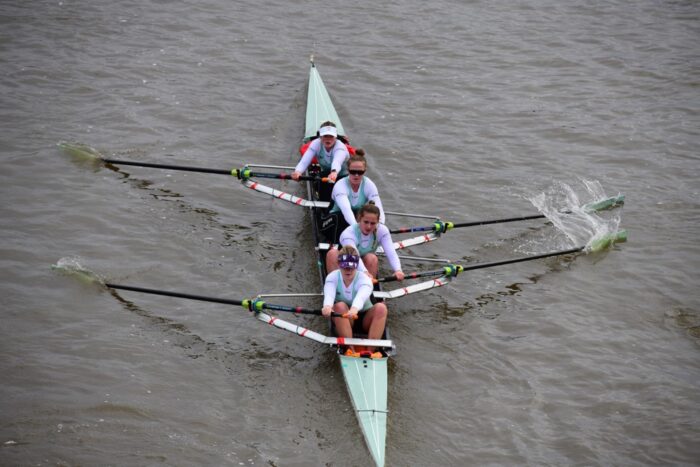
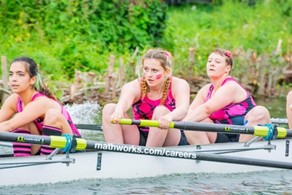
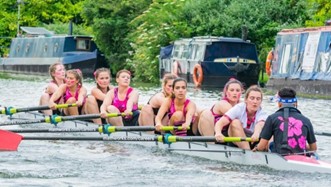
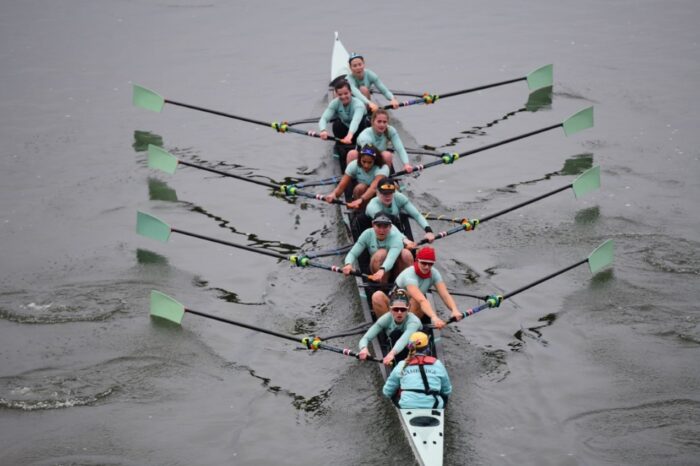
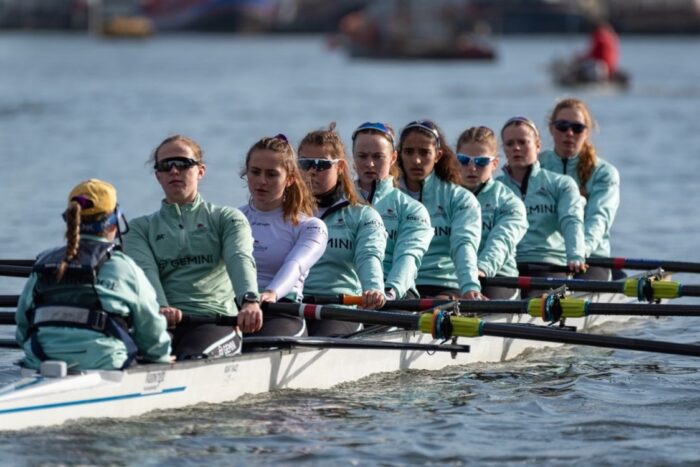
Nicky’s Story
I grew up in the United States in Texas near Dallas before moving to Massachusetts to study at Harvard University for my undergraduate degree, where I majored in Bioengineering with a minor in Economics.
As someone studying Biotechnology, I was attracted to Churchill’s forward-thinking focus on science, engineering, and technology.
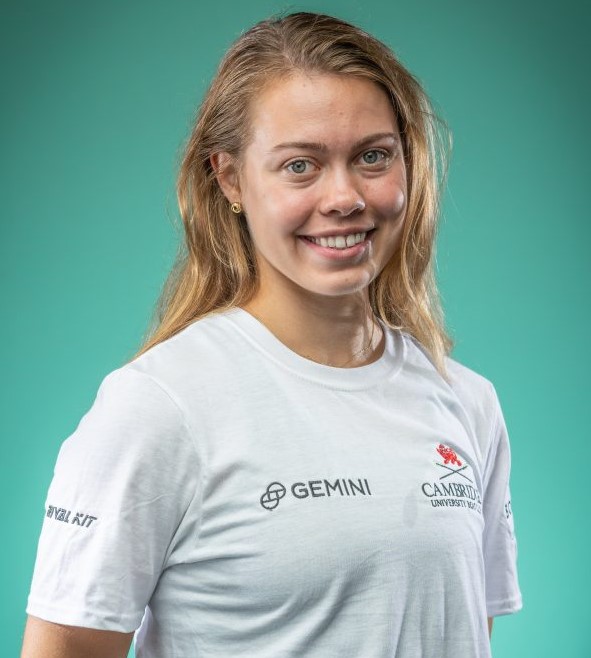
Combined with the supportive community, the relaxed atmosphere and expansive grounds of Churchill make it a very friendly, inviting college. I was also drawn to the large postgraduate community at Churchill, where I hoped to be able to connect with like-minded individuals.
Growing up, I was a competitive rhythmic gymnast for over 11 years competing at national and international levels. Unfortunately, when I began my undergraduate degree, injuries and the lack of nearby training facilities prohibited continued training. I desperately looked for activities to replace the space gymnastics had held for me, turning to everything from ballet to ballroom dancing. However, nothing fully fulfilled my insatiable desire to continue competing in a sport at a high level. That was when I turned to university sports which welcomed novices. Out of all these sports, rowing—with its focus on rhythm, strength, technique, and the dichotomy of the individual athlete in a team—felt the most familiar. The privilege of rowing with such a powerful team of women on the beautiful Charles River just added to the appeal of the sport.
When I began rowing, I was the second slowest on the team (and by team I don’t mean varsity team but the squad of novice rowers). In practice, rhythmic gymnastics and rowing do not have many similarities. Not only did I have to grasp the rowing technique on the water, I also had to develop strength, stamina, and fitness. To catch up with my team, I spent extra hours on the erg, supplemented cycling, running, and weight-lifting sessions. Additionally, I had a serious knee injury last year which prevented my return to the sport until just before trialing with the Cambridge University Boat Club (CUBC.)
Rowing for CUBC involves training every day with a combination of land and water training. As a team, we have at least 6 sessions on the water, 2 indoor rowing sessions, and 3 strength and conditioning trainings during each week. This term, we also travel to London every other week to race in side-by-side fixtures against other clubs in preparation for the Boat Race.
One of the most exciting moments of training with CUBC was stroking the winning the Fours Head race with my crew. My team and I overcome several challenges, including last minute crew changes as a result of injury. In the end, we were able to adapt and effectively work together to create a fast boat that ended up winning the race. I am constantly driven by the prospects of racing Oxford in the Boat Race and maintaining CUBC’s winning streak. On a day-to-day basis, I am motivated by the group of strong, inspiring women that make up the team, along with the encouragement and mentorship I continuously receive from our coaches.
I would definitely recommend rowing to students have never rowed before. There is something magical when everything clicks, and you are able to glide through the water in an all-too-narrow boat. Rowing is also a very rewarding sport, where all your efforts are not only reflected in individual improvement but also translate to speed felt by the entire boat. Finally, rowing builds on several character traits including resilience, dedication, communication, and teamwork.
After completing my MPhil at Churchill I plan to work in consulting for a few years before returning to academia to complete a PhD. Ultimately, I hope to work in the biotechnology industry, leading novel projects that have the potential to benefit human health.
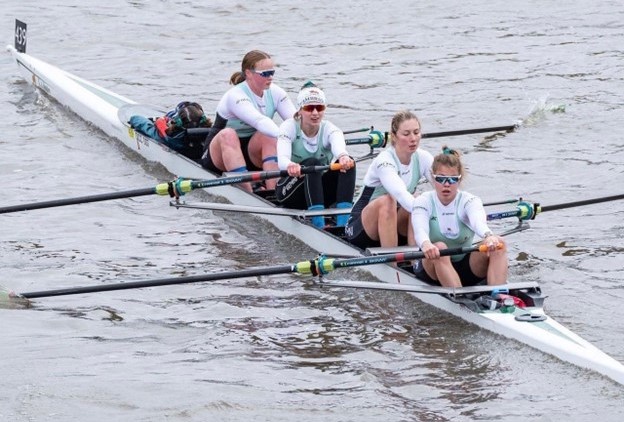
Nicky stroking the winning Four’s Head race with her crew
Supporting rowing at Churchill
Triallists like Iris and Nicky are required to fund all their training costs personally, and there is limited existing funding from the Hawks’ Club and the College to support these. The costs are currently over £2,000 for each student. We would like to raise at least £1,500 to help both Iris and Nicky meet more of their costs. To add your support please use this link and choose ‘other’ adding CCBC in the comment field. All gifts to the Boat Club, as with the College are tax-efficient and therefore if you are a UK taxpayer will increase by 25% at no extra cost to you. Thank you for your support!
The Boat Race
Every year over 250,000 people watch The Boat Race from the banks of the Thames and fifteen million watch it on TV. As noted on the CUBC website, this famous race is in fact two races, featuring the men’s and women’s Blue Boats of Oxford and Cambridge. The Blue Boat is the name given to the top crew from each university, whose members win the coveted Light Blue colours of Cambridge or Dark Blue of Oxford. The openweight reserve crews are raced between the Boat Races (after the women’s race and before the men’s). The men’s reserve crews are Isis, for Oxford, and Goldie, for Cambridge. The women’s reserve crews are Osiris, for Oxford, and Blondie, for Cambridge. The 2023 Gemini Boat Race Crew Announcement will be made on Monday 6th March and we wish Iris and Nicky the very best of luck!

